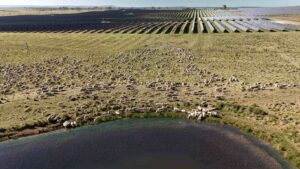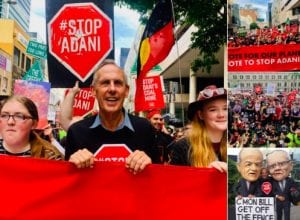When the Australian delegation was sent to UN climate change negotiations in the Mexican holiday town of Cancun three years ago, they were given strict instructions: On no account were any of them to be photographed in the swimming pool of the luxurious Moon Palace resort sipping tequila. Or any other drink for that matter.
At those talks, in 2010, Australia was seen to be playing a constructive role. It sent two ministers, then climate change minister Greg Combet, notable for wearing a real business shirt and riding a bicycle between appointments in the scattered expanse of the huge resort, and Mark Dreyfus, who had his training wheels on as parliamentary secretary.
In Warsaw these past two weeks, the much-reduced Australian delegation was also given strict instructions. On no account were any of them to be seen agreeing with any proposition or text that had anything to do with commitments to climate finance or increased ambition. Or so it appeared.
No minister was sent, and Australia gained notoriety for having two of its negotiators wearing t-shirts at a late night meeting. Poor nations, and even some developed countries, claimed they took great offence. But the reality is that no one would have given two hoots what clothes these negotiators were wearing if Australia were seen to be playing a constructive role in the talks. It was the brackets they kept inserting into the draft agreements that really offended.
As we noted earlier this week – Australia’s reputation as a constructive force at these negotiations has been trashed. The diplomats themselves are probably not to blame – t-shirts or not – they have simply had to work within very narrow ideological parameters set by the office of Tony Abbott and Foreign Minister Julie Bishop. The country’s role has been so obtuse that one delegate quipped it could even disqualify itself from membership of Cartagena Dialogue, the group of moderate countries it helped to found in Copenhagen in 2009.
Indeed, in the past few weeks, in Indonesia, Sri Lanka and in Poland, the new Abbott government has been bestriding the international stage with all the finesse of a drunk in a bar, knocking over chairs, offending bystanders, and throwing up repetitive slogans that most countries find incomprehensible.
The Abbott government – and the inner coterie of advisors that sets policies and controls the messaging – probably regards this criticism as a badge of honour. But it is equally likely that it has completely misread the mood of the international community, just as it apparently did with Indonesia and at CHOGM.
When the Coalition was last in government, such reversals of position might have been explained by the thought that climate change was something that happened to other countries. But that is no longer the case. The Prime Minister of the threatened island of Tuvalu, Enele Sosene Sopoaga, on in his address to the ministerial section, lamented the return in its Pacific neighbour of “climate change denial”. It’s an accusation that hasn’t been leveled against any country at these talks for several years.
Delegates here – be they official members of the government party, business types, or from environmental NGOs – are simply nonplussed by Australia’s backflip on climate change policies. The carbon price, the renewable energy target and the associated institutions have been the envy of most countries. “What the hell is going on down there?” is a question that has been repeated over and over again in Warsaw.
Such is Australia’s apparent ineptness on the international stage that there is real concern about the progress of policies under the G20 mechanism that Australia chairs, and hosts, in the coming year. It had been hoped that the G20 would make firm efforts to eliminate fossil fuel subsidies in 2014. The Abbott government had fantasized that it could help bring the US and China closer to a climate agreement. Not only are both countries dismissive of Australia’s new climate change policy infrastructure and ambition, neither energy nor climate feature on the program drafted for the G20 by Australia.
In its only public comment at these Warsaw talks – a 2 minute speech to the ministerial plenary – Australia simply repeated the domestic mantra of choosing Direct Action over a carbon price as the most effective means of emissions reduction. It insisted it respects the science, but would only contemplate emissions reductions that were “fiscally and economically” responsible. (See full text here) Most observers who have calculated the cost of insufficient action believe that statement of Australia’s misses the point entirely.
Indeed, most people here think the Abbott government’s trashing of the Labor/Green policy suite is self defeating. Just hours after Australia shoved the repeal of its carbon price through the lower house, China hosted an event in Warsaw highlighting the new carbon trading schemes it’s deploying in the capital Beijing and the principal commercial hub of Shanghai next week. Chinese officials said they are disappointed and surprised at Australia’s move. They are convinced that the cheapest way to emission reduction is in market mechanisms.
Australia’s opposition to climate finance also beggars belief. There is actually little difference between the Abbott government’s proposed emissions reduction fund that it wants to be the centerpiece of its Direct Action policy, and the mechanisms such as the UN-sponsored Green Climate Fund and the Clean Energy Finance Corp that it opposes so virulently.
The only difference is that the ERF will be a cumbersome, government-mandated grants program, rather than a mechanism that can leverage significant amounts of climate finance that have proved successful elsewhere in the world. Australia is simply denying itself the mechanisms that will pave the way for investments in low carbon technology, something that it is likely to reinforce by diluting the renewable energy target. The country risks leaving its economy hopelessly exposed, when it probably has better resources, expertise and mechanisms of any other economy in the world.
As for the climate change talks in Warsaw, some form of agreeable text will likely be found, probably late in the night on Friday. These talks never fail, they just rarely pass the bulls*** test. There were never any great expectations for Warsaw, because of the venue and because they were designed simply to tie up loose ends and remove as many barriers as possible as the caravan moves on to Peru, and then hopefully to an agreement in Paris in 2015.
“In coming hours Australia will either help repair or further inflame both damaged diplomatic links and brittle climate talks that it has no doubt put in danger,” said John Connor, CEO of the Climate Institute. “We will be looking for constructive commitments on tabling of action pledges well in advance of the 2015 December climate talks and preferably in late 2014 as well as good faith and constructive positions on financing and Loss and Damage.”
Some environmental groups expressed their disgust at the lack of ambition at the “coal COP” by staging a walkout. They will be back in Lima, but the real test will come at Ban Ki-moon’s leader’s summit at UN headquarters in New York a few months earlier. That’s when the actions of China and the US could be decisive. There are still huge gulfs to bridge. It’s really up to them.






